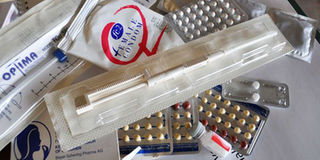Prime
Teenage pregnancy: Parents enrol girls on contraceptives

What you need to know:
- The parents were forced to resort to contraceptives because of increasing cases of teenage pregnancies as a result of the prolonged closure of schools to curb the spread of the Covid-19 pandemic.
A section of parents in Lango Sub-region have started enrolling their daughters on contraceptives to stop them from getting pregnant.
The parents were forced to resort to contraceptives because of increasing cases of teenage pregnancies as a result of the prolonged closure of schools to curb the spread of the Covid-19 pandemic.
In Lango Sub-region alone, between January and August, it is estimated that a total of 23, 549 teenage girls got pregnant.
In October, President Museveni said schools would reopen in January 2022 but some parents are worried that their daughters may not return to school if they conceive during the festive season.
Ms Dorcus Adongo, a resident of Ober Kampala Cell, Ojwina A Ward in Lira City, said she has been hearing a lot of media reports on rampant teenage pregnancies during the lockdown and decided to enrol her 19-year-old daughter on contraceptives.
“To make my daughter, who is joining Senior Five safe, I decided to take her for an injection pill so that she cannot get pregnant for at least three months,” Ms Adongo told Daily Monitor on Tuesday.
Ms Mary Odyek, a nurse at a private clinic in Dokolo Town Council, said on average about 10 teenagers seek contraceptives from her clinic.
However, Ms Odyek warned that there are risks associated with the use of contraceptives by teenagers, saying they are prone to hormonal damage that may prevent them from bearing children in future.
“Sexually active teenagers should use condoms, which not only prevent unwanted pregnancies but also protect them from sexually transmitted diseases like HIV,” Ms Odyek said.
Dr Robert Lapat, the manager of Reproductive Health Uganda (RHU) Lira branch, said the best way to control unwanted pregnancy is through emergency contraceptive pills which should be taken within five days after having unprotected sex.
He said at RHU they provide the pill at a subsidised cost of Shs5,000 per dose.
“People in the villages cannot afford Shs5,000 to buy this pill and above all it is not easily available. So, my humble request to government is that let these pills be available at all health facilities and free of charge if the problem of teenage pregnancy is to become history,” Dr Lapat said.
He added that health workers handling youth seeking these services must not be rude and should also not ask so many questions, which can scare them away.
Mr Morris Chris Ongom, the chief executive officer of Global Forum for Development (Gloford) Uganda, a non-government organisation operating in Lango, said the rise in teenage pregnancy after the outbreak of Covid-19 is a global challenge.
He said many girls who got pregnant were in the age bracket of 12 to 16 years, adding that parental negligence was a key cause of the rise in teenage pregnancy.
“We have a situation where many young girls are struggling with fistula, many of them have become mothers and some of them have been married off,” Mr Ongom said.




